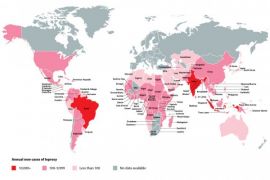"Indonesia, with a relatively large population, is a potential market for the cigarette industry," said Maxi Rein Rondonuwu, the ministry's Director General of Disease Prevention and Control (P2P), at a press conference for World No Tobacco Day 2023 in Jakarta on Monday.
Based on the 2013 Basic Health Research (Riskesdas) data, the prevalence of smokers between the ages of 10 and 18 was 7.2 percent. This increased to 9.1 percent in 2018.
"In five years, the number of children and teen smokers has increased by more than two percent. We are waiting for the results of the latest survey in 2023," Rondonuwu said.
This figure is in line with the survey results from Global Youth Tobacco in 2019, which showed that the increase in the prevalence of smokers in the school age bracket of 13 to 15 years grew from 18 percent to 19 percent.
In 2020, The Tobacco Atlas placed Indonesia in the third rank for the number of smokers in the world after China and India.
Rondonuwu noted that over 27 million adult smokers in Indonesia are at risk of contracting both communicable and non-communicable diseases.
The Institute for Health Metrics and Evaluation reported in 2019 that tobacco smoking increases the risk of tracheal, bronchial, and lung cancer by 59.6 percent, chronic obstructive pulmonary disease by 59 percent, heart problems by 28 percent, and diabetes mellitus by 19 percent.
Apart from the negative impact on consumer health, Rondonuwu said tobacco cigarettes also have social and economic impacts.
Data from the National Socioeconomic Survey (Susenas) in 2021 reported that family spending on cigarette consumption was three times higher than spending on protein.
"Shopping for cigarettes is the second-largest household expense, or three times higher than buying eggs, chicken meat, and others," he remarked.
Moreover, cigarette spending constituted the second-largest chunk of expenditure in poor households, at 11.9 percent, both in urban and rural houses.
World No-Tobacco Day is celebrated every May 31. This year's global theme is "We Need Food, Not Tobacco."
This activity aims to raise public awareness to increase the intake of nutritious food instead of consuming cigarettes and at the same time serves as a momentum for tobacco farmers to switch to cultivating other crops that have high nutritional value and marketability.
Related news: Cigarettes pose threat to Indonesia's demographic bonus in 2045
Related news: Ministry to launch non-smoking area (KTR) dashboard soon
Translator: Andi Firdaus, Resinta S
Editor: Anton Santoso
Copyright © ANTARA 2023












